Two Faces One Line Drawing
The art of one line drawings
What is a one line drawing and what makes each one unique?
![]()
Recently I started making one line drawings. But I am not the only one, and definitely not the first person to make these kind of drawings. The most famous example even dates back to the early 20th century, the one line drawings made by Pablo Picasso. He took a complex, realistic example and simplified it into one single unbroken line. These drawings can look relatively simple to make, but capturing the true essence of the shape in just one line can be quite challenging. So how do artists perceive one line drawings nowadays?
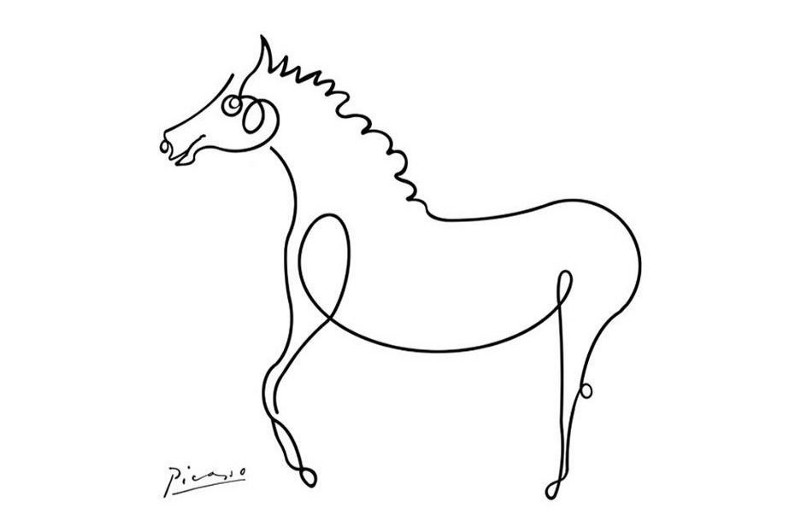
A one l i ne drawing, also known as a single line drawing, is a drawing made with just one line. For most artists it is a way to simplify the complex world around us. Yet there are many different kinds out there, with each artist having their own specific charisteristics. The main differences I found are:
- Simple versus complex
- Smooth versus rough
- Sharp corners versus curved corners
- Analog versus digital
- One thickness versus a variation of thin and thick areas
- With or without filled areas
- With or without color
- Open or closed
- Focussed on a theme such as animals, full body illustrations, portraits or erotics
So let's have a look at some examples to get an idea behind the differences and their motivation as an artist.
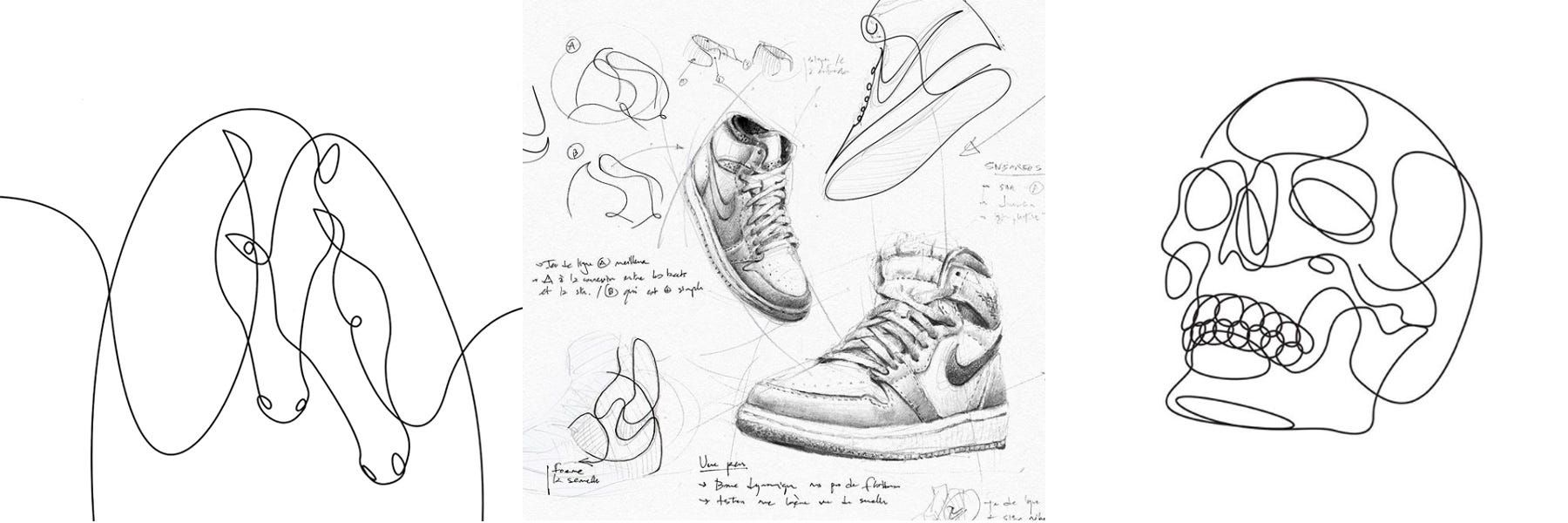
First of all the work of the French artist duo 'Differantly', in short DFT. I think they are one of the most well known one line artists that are active today, as they collaborated with big brands such as Adidas, Nike, Nissan, Hermès and Adobe. They deconstruct complex imagery into two-dimensional minimalist art, focusing on what creates a subject's core identity.
"During our process, we go through phases that are visually rich and complex before removing what's not substantive. It's a maturation process that can be painful as it consists of letting go, giving up. But, it's also very demanding as minimalism requests a certain level of perfection. Every element must have its sense, its utility, its intrinsic beauty."
— About DFT
DFT's style is minimal and straight forward. The line keeps the exact same thickness throughout the whole piece and flows in both sharp corners, as well as smooth curves. The line does not connect the beginning with the end, leaving the image open. This is the case with all of the following examples, except the last one.
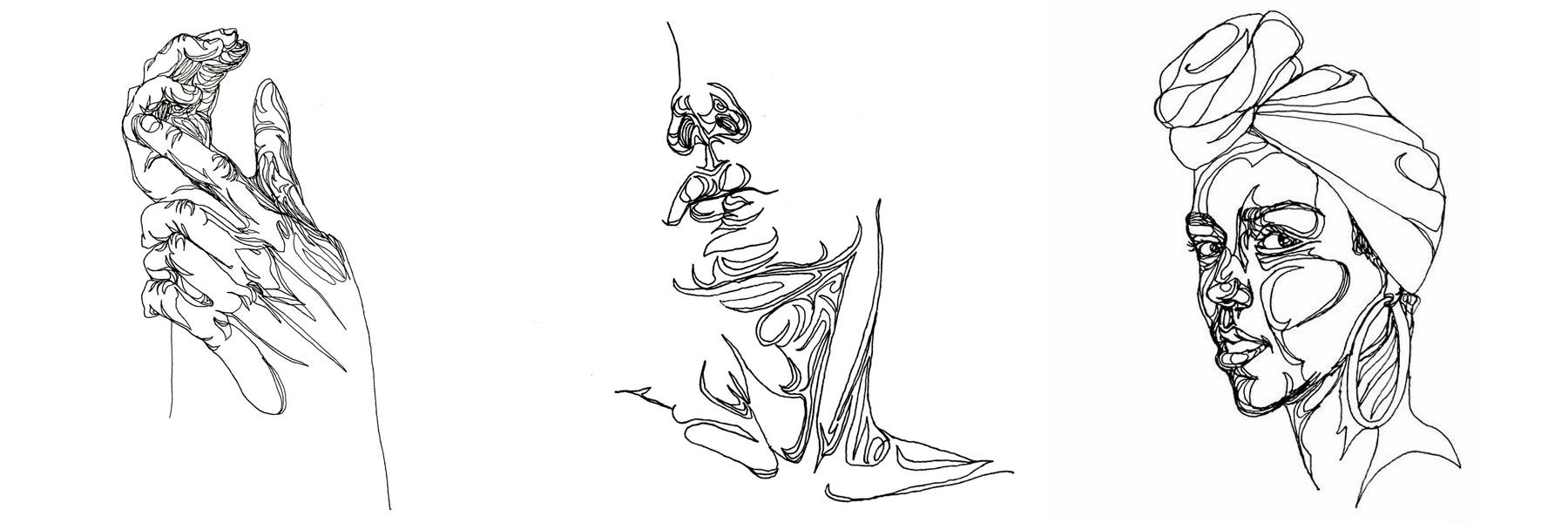
At the other end of the spectrum you have the work of Katie Acheson Wolford. Her work is complex and yet drawn with only one line. She draws her artwork by putting the pen on paper and not taking it off until the piece is finished. She is challenging the way her hand and eye work together, as her pen has to keep moving fast enough in the right direction.
"You have to find kind of the sweet spot between too fast and too slow. Because if you go too slow you start to overthink, and if you go too fast you may overlook a really important line. It all happens in the drawing itself, and it either works or it doesn't work, and that is the amazing part about it."
— Katie in a video of INSIDER
Katie's style is complex and organic. She uses a fine tipped pen which keeps the line consistent, yet you can see where it has moved faster and slower or was more pressure put on. Her work is clearly analog, whereas the work of DFT has the feel of a digital finish with its precise lines.

Up next is Flowsofly. The style of this artist is quite divers. But it's always within the same theme: erotica.
"I get bored very easily and can't be bothered with figuring out details, but instead the process to get to the idea is the exciting thing for me. So I also work this way now when I usually see a photo or a movie scene or read something and then want to deconstruct that, interpret that, explore the idea, explore how I see it… and then the craft is more the necessity, and something that I had to get reasonably ok at, but still I enjoy the conceptual part of the work a lot more. The pen sketches are just a quick way of expressing these concepts, giving a viewer enough to see it but not everything, not the whole picture."
— Flowsofly in an interview with WE ARE MORTALS
As the work ranges from very rough to quite smooth, very complex to fairly simple, just the line or also including fills — the work is mainly recognizable by its erotic scenes. With an overwhelming amount of 1189 drawings (and counting) on Instagram this one line artist has been around for a while and has been a great inspiration for many others.
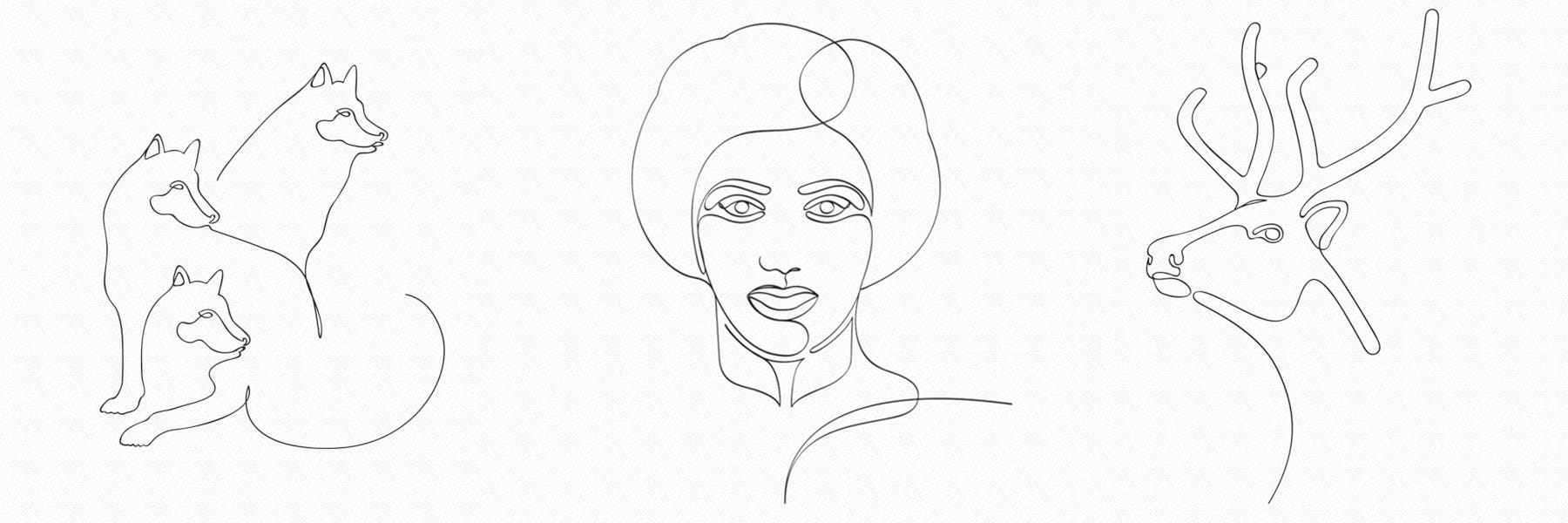
Notion is a design studio based in New Zealand, run by Ken the one line illustrator. His drawings are minimal and smooth, and so are the graphics displaying the artwork on his website. The goal is to evoke an emotional response from the viewer, inspiring to go beyond traditional boundaries.
For this article he shared his personal vision: "My take on one line illustration has always been about building an authentic connection with the viewer. As a one line artist myself, I see a poetic resonance represented through the singular line. I see the possibilities one line has to offer to all creeds and walks of life. Because it is so encompassing, I see its potential in being an art form that is relevant especially in today's world. We started Notion to make one line accessible and for people to find enjoyment and a way of expression."
"With one line, we want to bring awareness to certain issues we face globally as a community, in hope of creating dialogue and influencing positive change. After all, what is the point of art if it doesnt help people. If it doesn't evoke emotion. If it doesn't challenge thinking."
— Ken from Notion
As mentioned before his style is very smooth and you will hardly see any sharp turns. The line is clean and easy to retrace for the viewer. The work is super consistent and usually evolves around living creatures, including plants, animals and humans.
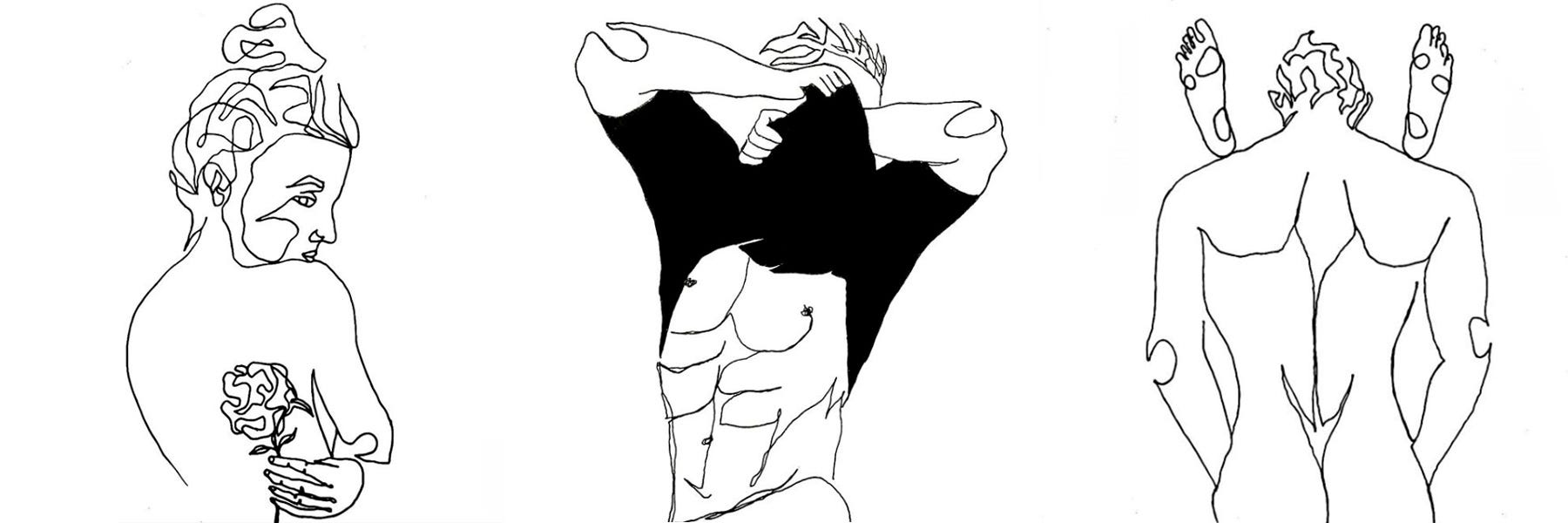
Subhankar is a one line artist from India. As we have been following each others work for a while, we started discussing our working methods.
"I mostly do people through onelines. People and moments. They are complex and fascinating and I like to study them… deconstruct them so I can understand it better. It's so amazing that a line is the most basic thing we learn as artists and then make it all so complex. But how wonderful it is that we can represent everything complex through a simple single line. That's basically why. Deconstruction of people and moments."
— Subhankar
Subhankar either uses just one line or a mixture of a line and fills. His style is raw and rough, comparable to that of Flowsofly. Also, the work has the same erotic theme. But in contrast to the diversity of Flowsofly, Subhankar so far sticks to just one style, giving the art an overall consistent look and feel. But who knows what the future holds. As he told me: "I'm just trying to be right now. Especially since I just started one lines. Just going with the flow."
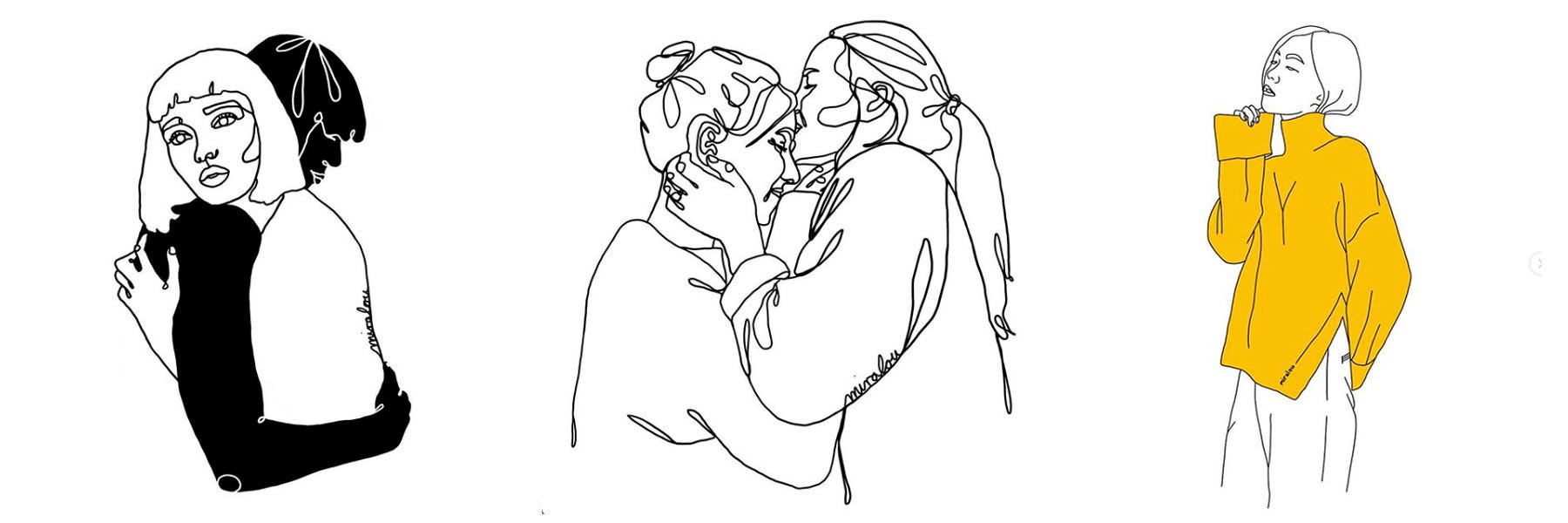
Mira Lou captures moments of life in her drawings. There are often situations and emotions in her work that anyone can recognise from their own experiences.
"I really love line drawings as a medium because they force you to focus on visual essentials. Sometimes it's really difficult to get the special characteristics of a person right with the limited possibilities of a line drawing. But I really like the minimalism and simplicity a line drawing can communicate when you succeeded."
— Mira Lou
I asked her how she would describe her style compared to other one line artists. Mira Lou: "Actually I never really compared my work with others. I would say that I express my feelings and emotions trough my work and therefore my lines are reflecting a part of myself. Additionally everybody perceives visual things different, so I would choose other elements as important in comparison to other people I guess. Personally I can say, that I really enjoy lines that are very smooth. At least in my work. I also admire other artist that are able to have a messier or rougher style."
Actually Mira Lou is the first in this list who actively uses color in her work. We have seen other artists using black fills, but you will find colored lines and fills in her portfolio. Her lines are smoother than some of the examples above, but not as smooth and minimal als the work of DFT and Notion.
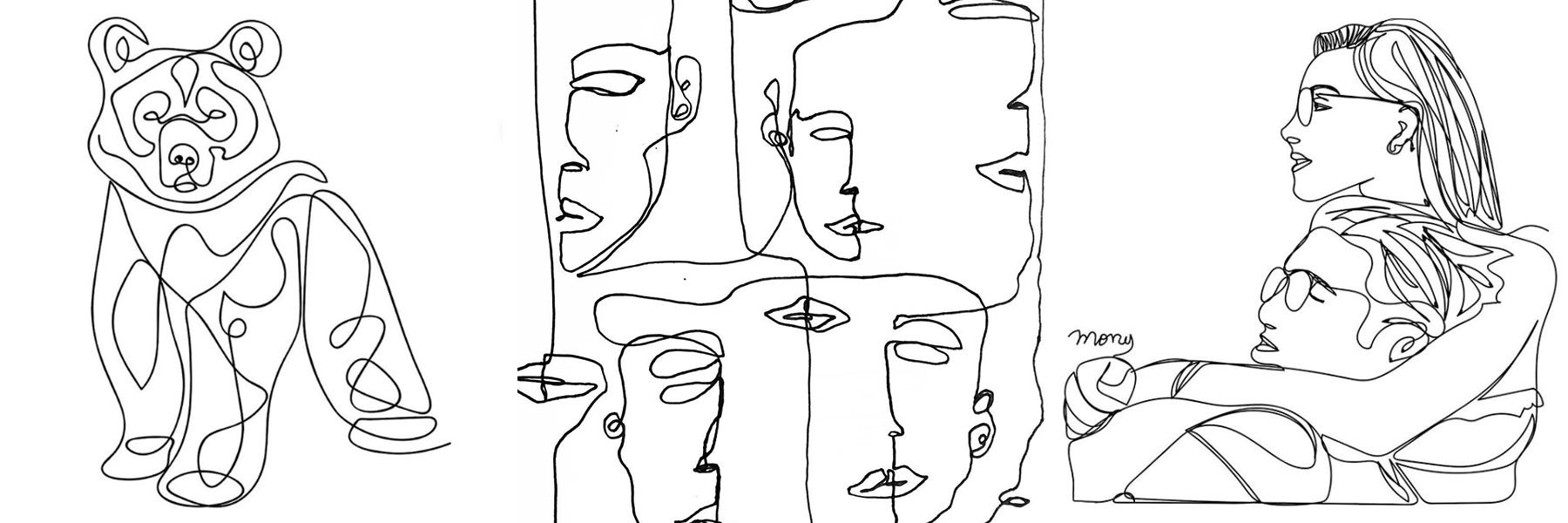
Mony also has a quite diverse portfolio, ranging from solo objects, to complex scenes, to the freehand faces you see in the middle.
"For me to draw in one line is like a therapy, also is the way I see the world. I really think that there is a connection between our body and the things, people, places and vibes that surrounds us. I love the idea of letting my hand do what ever it likes, it's like drawing the shape of my thoughts."
— Mony
The first and last image above relate to the style of other artists mentioned before, but the middle one is new in this list. It is a rough free hand, yet very minimal way of drawing. She just starts drawing face by face, letting her hand flow freely without taking the pen off the paper. This creates a very rough, very artistic image.

And last, my own artwork. As I quit my job to become a full time artist I wanted to start with a project that would allow me to create something custom for my audience. Art that would be available for everyone, yet unique for you personally. Thus the start of Flow by Gemmi Art.
Since there are many other artists out there, I was looking for a way to differentiate myself from the rest. I admire Mira Lou for not comparing her work with others and staying true to herself. Also it is very true everyone perceives visual things differently. Yet by looking at the work of others I became inspired and got to know what not to do. I wanted to create something that was not yet done before. I believe that these boundaries spark my creativity, as the options become limited, it becomes more of a challenge to be original.
I concluded none of the artist 'close' their drawing. The line begins somewhere and ends somewhere else. Yet closing the line would truly 'capture' the essence of the image.
"We surround ourselves with things we love. Things that are useful and comfortable, that inspire us through their beauty or that capture memories of people and moments we treasure. Things that represent who we are. I made it my mission to capture these moments in just one continuous line."
— Michelle, Gemmi Art
I set some basic rules that would keep my art consistent and hopefully set me apart from the rest. The line has one thickness, only curved turns, it should overlap other parts of the line as little as possible and has no fills. It should be as minimal as possible, yet still capturing the unique characteristics of the subjects. But most importantly — the line should have no beginning, no end, it is one. It is flow continuously and forever.
This is just a selection of artists that make one line drawings, but there are many of us out there. Yet we all have our own unique style and philosophy behind our work. Thanks for reading, I hope this article helps you understand one line drawings in a new way.
And of course the burning question: What style do you like best?
Gemmi Art makes meaningful art that fits the wishes of the audience. With the first project "Flow by Gemmi Art" you can get a custom hand made one line drawing based on a photo you upload. In case you are looking for a unique personal gift — or — art to upgrade your interieur,
make sure to check out my Etsy Shop
Follow to get the updates, tips and tricks 📫
Two Faces One Line Drawing
Source: https://medium.com/@michellegemmeke/the-art-of-one-line-drawings-8cd8fd5a5af7
Posted by: serranopentagess.blogspot.com

0 Response to "Two Faces One Line Drawing"
Post a Comment